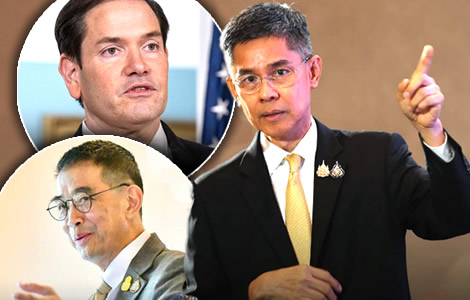Thailand must fight harder in the info war as Cambodia outpaces it diplomatically. With the US turning neutral, an expert warns Bangkok to act fast, engage foreign media aggressively and unite security and diplomacy to protect itself amid the escalating border crisis.
A top Thai security expert is warning Bangkok to get serious about the information war over the Cambodian border crisis. With the United States—Thailand’s key military ally—now acting as a neutral player, the stakes are rising fast. Despite a high-profile appearance before the UN Security Council on Friday and a surprise call from U.S. President Donald Trump on Saturday, Thailand is losing control of the narrative. Dr. Panithan Wattanayagorn says Thailand must stop playing catch-up and start aggressively shaping the global conversation. “We’re falling behind,” he warns, as international headlines increasingly blur the lines between victim and aggressor. Since hostilities erupted last Thursday, Cambodia has seized the media momentum. Thailand, he says, can no longer afford to stay silent.

A top Thai foreign affairs and security expert has raised urgent concerns over Thailand’s position in a growing border crisis. Cambodia, he warned, has successfully outpaced Thailand in the global diplomatic and media arena.
The warning follows a tense weekend of international pressure, broken ceasefires and high-level phone calls from Washington. Although the situation remains fluid, Thailand now faces mounting challenges in diplomacy, international image and cross-border security.
On Saturday night, U.S. President Donald Trump made a surprise phone call to Thailand’s Acting Prime Minister Phumtham Wechayachai. The call was unexpected and caught Thai leadership off guard. Trump issued a clear ultimatum: agree to a ceasefire with Cambodia or risk losing progress on tariff negotiations with the U.S.
Thailand agrees to ceasefire after Trump’s call but Cambodia breaks it just three hours later
As a result, Prime Minister Phumtham quickly agreed to a ceasefire in principle. He did so after consulting senior figures, including Deputy Minister of Defence Nattapol Nakpanit and Foreign Minister Maris Sangiampongsa. The decision came under immense pressure to preserve Thailand’s economic ties with the United States.
However, the ceasefire did not hold. After just three hours, by 2 a.m. on Sunday, Cambodia had violated the agreement. Clashes resumed shortly after, reigniting concerns of a broader military confrontation.
Associate Professor Dr. Panithan Wattanayagorn, a respected expert on foreign policy and security, analysed the sequence of events on Sunday. He said that despite the challenges, the direct call from Trump also opened new opportunities. “This is a moment to unify economic and security strategies,” he said. “Trump links trade with defence. Thailand can use that to its benefit.”
Nevertheless, Panithan stressed that Thailand must act fast. According to him, Cambodia has prepared extensively and gained ground through international lobbying and media outreach.
“They have engaged the permanent members of the UN Security Council. Even the United States may be leaning neutral,” he warned.
Cambodia builds global support while Thailand struggles to gain traction at the UN Security Council
Moreover, he noted that Cambodia may have already coordinated with France and China, two of the UN Security Council’s permanent members. “Cambodia has successfully pushed to put the issue on the UNSC’s agenda under ‘international security threats,’” he added.
In contrast, Thailand has failed to generate comparable diplomatic traction. At Friday’s UNSC meeting in New York, little progress was made in Thailand’s favour. Unlike in 2011, when the UNSC pushed for an immediate ceasefire and ASEAN mediation, this time the outcome was vague and lacked urgency.
As a result, Thailand now faces significant disadvantages, especially in the field of information warfare. “International media still report this as a mutual clash,” Panithan said. “They often fail to mention that Cambodian forces attacked Thai civilians and infrastructure.”
Because of this, he recommended urgent action to improve Thailand’s communication with foreign media. Specifically, he called for the creation of a foreign press war room. “It must deliver real-time updates in multiple languages,” he emphasised. “We must correct false narratives and present facts clearly.”
Panithan urges creation of media war room to counter Cambodian propaganda and foreign press bias
Furthermore, Panithan underlined the importance of involving a neutral third party in ceasefire talks. “Any temporary or long-term peace deal must be monitored,” he said. “There must be trusted mediators and international observers on the ground.”
Thailand, according to Panithan, should also consider establishing a buffer zone, similar to strategies used during the Cambodian civil war. “A security line between the forces would reduce incidents and protect civilians,” he noted.
In parallel, Thailand has now agreed to involve Malaysia as a neutral mediator. Malaysian Prime Minister Anwar Ibrahim will play a key role in brokering discussions between Thai and Cambodian leaders. A meeting between Prime Minister Phumtham and Cambodian Prime Minister Hun Manet is expected to take place later on Monday.
This development followed another major diplomatic intervention. On July 27, U.S. Secretary of State Marco Rubio spoke with Thai Foreign Minister Maris Sangiampongsa in a high-level conference call. According to a statement released by the U.S. Embassy in Bangkok, Rubio urged Thailand to de-escalate tensions immediately.
U.S. backs Malaysian mediation while Rubio pushes Thailand to de-escalate tensions with Cambodia
He also reaffirmed President Trump’s position. “The U.S. supports an immediate ceasefire,” the statement said. “Washington is ready to coordinate peace efforts between both nations.”
Despite these moves, Panithan remained cautious. He acknowledged that involving the U.S. as a mediator was helpful. Nonetheless, despite the fusion of security and trade as a winning strategy, it also presents a challenge. He warned it could also complicate matters. It demands expert management. “If economic and defence issues become mixed, the situation becomes harder to manage,” he explained.
Although the Thai military maintains a strategic advantage in manpower and capability, that edge has not translated internationally. “Thailand still holds the line on the ground. But we are losing ground diplomatically,” Panithan said.
He also criticised Thailand’s delayed diplomatic response. “Cambodia is shaping global opinion. They are fast. They are prepared. We are behind,” he said.
For instance, Cambodia reportedly announced a ceasefire to international media while simultaneously continuing attacks. “It creates an illusion of responsibility,” Panithan said. “That damages Thailand’s image and legitimacy.”
Cambodia wins PR war by declaring peace but continuing attacks and outpacing Thailand diplomatically
Therefore, he urged Thai officials to treat the current situation as a diplomatic emergency. “We must engage the U.S., China, ASEAN, and Europe immediately,” he said. “We must expose the truth—especially attacks on civilians and hospitals.”
He emphasised that under international law, targeting civilian infrastructure is among the most serious violations. “These are not just border clashes. These are breaches of fundamental human rights,” he said.
At the same time, Panithan acknowledged that tensions had not yet escalated into a full-scale war. “There is still restraint,” he said. “Both sides are avoiding full-line combat and heavy weapon use.”
However, he cautioned that the situation could change quickly. Military units remain deployed across sensitive areas. Incidents may continue to flare up in flashpoint zones.
In light of this, Panithan called on Thailand to pursue backchannel diplomacy. “Trump’s call is an opportunity,” he said. “Use that direct link to ask for deeper U.S. engagement—pressuring Cambodia and reducing its military support.”
Panithan urges quiet diplomacy with U.S. and China to halt arms flow and hold Cambodia accountable
He also proposed that Thailand open urgent talks with China. “Preventing weapons from reaching Cambodia must be a priority,” he added.
According to Panithan, the coming days will be crucial. He believes that Thai diplomats must leverage every channel available—bilateral, regional and global.
If Thailand can quickly realign its diplomatic strategy and control the narrative, the balance may still shift. But if it continues to lag behind, Cambodia’s momentum on the international stage may become irreversible.
Acting PM travels to Kuala Lumpur for ceasefire talks. Cambodia’s PM Hun Manet to attend amid PR war
Thai Deputy Minister of Defence explains Cambodia broke the Trump-brokered ceasefire Sunday morning
Finally, he urged Thai agencies to work as one. “Unite security, diplomacy and economy,” he said. “Only a coordinated response will protect Thailand’s sovereignty and global reputation.”
As of now, the situation remains tense but under observation. All eyes are on the upcoming Malaysia-brokered meeting between Thailand and Cambodia. The stakes—for regional peace, international law, and national dignity—could not be higher.
Join the Thai News forum, follow Thai Examiner on Facebook here
Receive all our stories as they come out on Telegram here
Follow Thai Examiner here
Further reading:
Acting PM travels to Kuala Lumpur for ceasefire talks. Cambodia’s PM Hun Manet to attend amid PR war
Hot War rages on the Thai-Cambodian border following Cambodian troops offensive in Chong Bok area


















